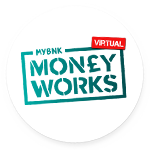
A fool and his money are soon parted...
 Just having money isn’t enough nowadays – we need to be smart with our cash too.
Just having money isn’t enough nowadays – we need to be smart with our cash too.
We’re going to show you how to stay safe with your cash and avoid getting into massive debt.
APR vs AER
Interest is always represented as a percentage. However, there are different types of interest you may get:
- If you SAVE money, you will get AER – Annual Equivalent Rate – and it will pay you. That means you want a HIGH AER.
- If you BORROW money or take items on credit, you will be charged APR – Annual Percentage Rate – on top of the value of your loan or items. You want this to be as LOW as possible.
Responsible Lending
Although banks and lending companies have some rules and guidance about who they can lend to, they don’t always follow this advice. It is always up to you to think about whether you can afford the borrowing or not – not the bank.
Before taking any loan or credit, you should be clear about the costs to you. This means knowing how much you need to pay back each month, what the rate of interest is, how long you’ll pay for and how much in total you will pay with all the interest included. If you cannot afford the payments now, don’t borrow and hope you can find the money later.
There are many ways to borrow, and some are better than others.
The two factors that will affect how much you need to repay are:
- The length of the loan.
- The rate of APR (interest): The higher the rate of interest (%) the more money you will pay back.
So if you have two loans with the same interest rate but one is for 1 year and the other is for 3 years, the 3 year agreement will cost you more in extra interest.
If you have two loans of the same length, the one with higher APR will cost you more in extra interest.
If you have any control over the repayments, you should aim to pay back the loan in the shortest time possible while keeping the repayments manageable. If you are struggling with your debts, always seek professional advice – don’t try and do it on your own.
Credit Scoring
 A credit score is a tool used by lenders to help determine whether you qualify for a particular credit card, loan, mortgage or service.
A credit score is a tool used by lenders to help determine whether you qualify for a particular credit card, loan, mortgage or service.
Using the information on your credit report and any additional information you supplied as part of your application, lenders use a mathematical model to calculate a score that represents your credit history. This helps to indicate what kind of borrower you are, and how likely it is that you will manage your repayments.
You can check your credit score for free using a number of websites – Credit Karma, Clearscore and Experian are all popular – and see what the credit companies can see about you.
If you see a mistake on your credit file, you can ask for this to be corrected. If this then changes your credit score, it will change to show this.
Improving Your Score
Here are some tips to help you get your credit score as high as possible:
- Register to vote – this can be the difference between getting a phone contract. You don’t need to vote to get the benefit, just register.
- Close any other accounts you may have, especially credit accounts like credit cards or bank accounts with overdrafts.
- Don’t make too many credit applications. You will look desperate for credit and lenders will think you are high risk. Make sure you leave at least 3 months and ideally 6 months between applications.
- Keep on top of your repayments – missed payments hurt your file, even if they’re only a day late.
- Close any joint accounts that have a bad credit record.
- Try to keep your income regular.
Debt Diary
If you cannot make repayments to a creditor (someone you owe money to), there is a process most will follow to try and get their money back.
Some priority debts have different outcomes – missed rent could mean eviction, missing a gas bill could mean being cut off etc – but for most non priority bills, the process looks like this:
- They’ll send letters to remind you of the debt.
- You’ll get phone calls – at this point, they usually add interest and mark your file with a late payment.
- The letters will be more threatening after this, warning of further legal action.
- The company sell your debt – this then goes to a debt collector.
- The debt collector will send you letters to repay – this will usually include extra charges. Your credit file will be marked with a default (closed account without full repayment) and this will have a big impact on your credit score.
- The debt collector will attempt to collect goods from your home to auction. If they do not make enough at auction, they will come back for more goods until the debt is repayed.
- If the debt collector doesn’t recover the debt, or if the debt hasn’t been sold, it will usually go to a County Court. If the judge believes you owe the money, a County Court Judgement (CCJ) will be given to you. This will go on your credit file for six years and will make it hard to get other forms of credit.
For more information about what happens if you can’t repay a debt, we’d recommend checking our StepChange or the Citizens Advice website who have detailed information and trained staff who can help.
What's Money Muling?
 You might have heard of this under a different name – some people call this AC’s, squares, nattys etc. It’s basically when someone asks you to accept a payment and then either withdraw and give it to the recruiter or to transfer most of it on, leaving you with a small cut.
You might have heard of this under a different name – some people call this AC’s, squares, nattys etc. It’s basically when someone asks you to accept a payment and then either withdraw and give it to the recruiter or to transfer most of it on, leaving you with a small cut.
However – there’s a reason they need you. If the fraud is caught (and banks have systems to make this easier for them than you might think!) YOU will be the one in trouble!
Here’s what Action Fraud says about money muling:
“Money mules are recruited, sometimes unwittingly, by criminals to transfer illegally obtained money between different bank accounts. Money mules receive the stolen funds into their account, they are then asked to withdraw it and wire the money to a different account, often one overseas, keeping some of the money for themselves.
Even if you’re unaware that the money you’re transferring was illegally obtained, you have played an important role in fraud and money laundering, and can still be prosecuted. Criminals will often use fake job adverts, or create social media posts about opportunities to make money quickly, in order to lure potential money mule recruits.”
You should also be aware that if you are caught as a money mule, you face up to 14 years in prison. You will also have a notice placed on your credit file (known as a CIFAS notice) and this will stop you from getting anything from bank accounts to mobile phone contracts. This will last for 6 years – a long time to not have a bank account.
Avoiding Scams
- The golden rule with scams is the one you’ve probably already heard: “If it sounds too good to be true, it probably is!”
- Always think about what the other person is going to get from this – if a stranger is giving you the chance to make money with no gain to themselves, you should question why they would offer the chance to you and not do it themselves.
- Be aware of people telling you to keep the situation to yourself – this is usually so someone else doesn’t hear your story and tell you it’s a scam.
- Scammers will pressure you to act quickly – if you think this is the case, slow down and tell them you’re not sure.
- Be super careful about anyone asking you to transfer money to a bank account – if you do and they withdraw it before anyone knows it’s a scam, the banks don’t have to return it because you freely sent it.
- Be aware of anyone saying they’re from your bank and asking for your pin. Your bank would never ever do this. If in doubt, hang up and call the bank back on a number you know is safe from their website. Scammers can fake text messages from banks now, so if in doubt make sure you shout.
- If you think you are the victim of a scam, contact Action Fraud as soon as possible – their website is in the list at the end of this leaflet.
Useful Tools
Websites
- Credit Karma / Experian / Clearscore – Credit checking websites. It’s free to sign up and you can see the information on your credit file.
- Credit Ladder – Get a credit score from your rent – which usually doesn’t happen.
- Money Advice Service – This website helps people manage their money and deal with worries with money management. Offers advice and signposts to other organisations who might help.
- Stepchange – Free debt advice, available over the phone or online.
- Money Supermarket – Useful calculator for seeing how APR and length of loan affect any borrowing.
- Actionfraud – Help and support for people who have been the victims of scams and fraud.
Apps

Credit Monitor (IOS/Android)

Clearscore (IOS/Android)

Experian (IOS/Android)

Credit Karma (IOS/Android)
Please contact info@mybnk.org to discuss any financial education needs for young people you may have.



